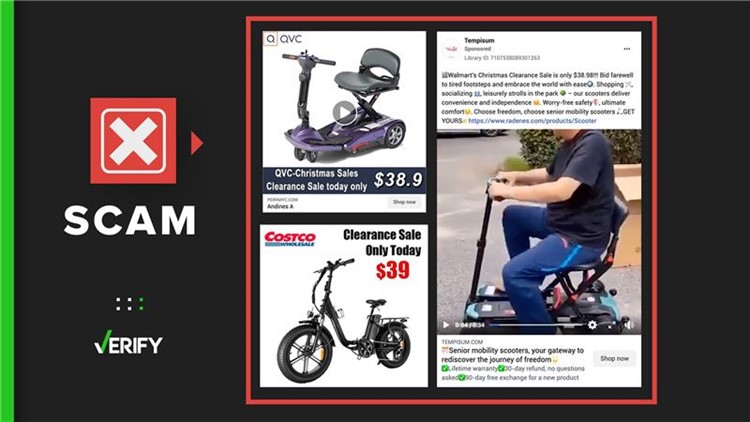With so many advertisements for products online, it can be hard to know when a deal you see is too good to be true. Promotions for scam products are regularly found on Facebook.
VERIFY reader Pat reached out to ask about one of these types of advertisements on Facebook. It shows electric mobility scooters on sale for $39, which appears to be a major discount on a device that can cost hundreds to thousands of dollars. They wanted to know if the ads are legitimate or scams.
THE QUESTION
Are Facebook advertisements for $39 mobility scooters legitimate?
THE SOURCES
THE ANSWER
No, Facebook advertisements for $39 mobility scooters are not legitimate. The ads deceptively lead viewers to scam websites.
WHAT WE FOUND
Facebook posts advertising $39 mobility scooters are scams. Many of the ads use real logos and names of credible companies to trick customers into buying the scooters from fraudulent websites.
Typically, advertisements that sound too good to be true often point to scams. Mobility scooters sold by other reputable retailers range from $400 to a few thousand dollars.
One of the scam advertisements features a Costco logo but redirects viewers to purchase a mobility scooter from a website called Coniwei. The Better Business Bureau (BBB) issued alerts about the Coniwei site after it received numerous complaints from people who were charged for products they never received and were unable to reach the company.
The BBB says it reached out to Coniwei in September, but has yet to receive a response. The Bureau “urges consumers to use caution based on their complaint activity and lack of responsiveness.”
Additional advertisements on Facebook, like the one VERIFY reader Pat asked about, claim QVC is selling mobility scooters for $38.99, but the URLs do not link to the official QVC website. The websites attached to the advertisements have URLs to pages with completely different names, like “gwcorry” or “tempisum.”
QVC is currently selling the same mobility scooter pictured in the ad for $2,198.98 on its official website.
A search conducted in Meta’s Ad Library showed that many types of these scooter scam ads have popped up over the last few months under different page names, linking to different websites. Like the previous examples, they often use the name or logo of a known company to lure Facebook users onto their sites.
One of the key ways to tell if the website is a fake, the BBB says, is to look out for “low quality visuals, odd layouts, and poor web design.” It’s also important to pay close attention to the URL, as some scam sites try to imitate the URLs of real websites. VERIFY has more information on how to spot an online shopping scam here.
If you are the victim of a scam, you should report it to the police, your banking institutions and credit bureaus. Learn more about how to do that here.



